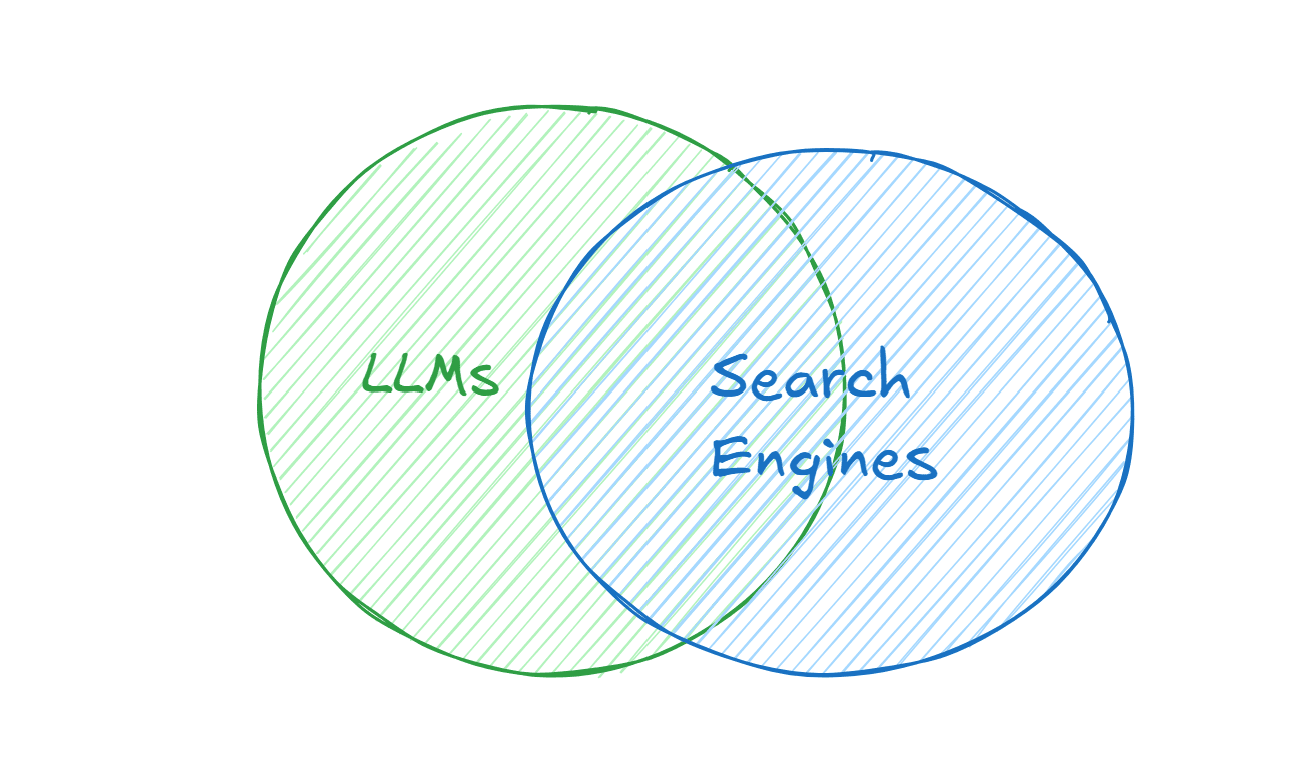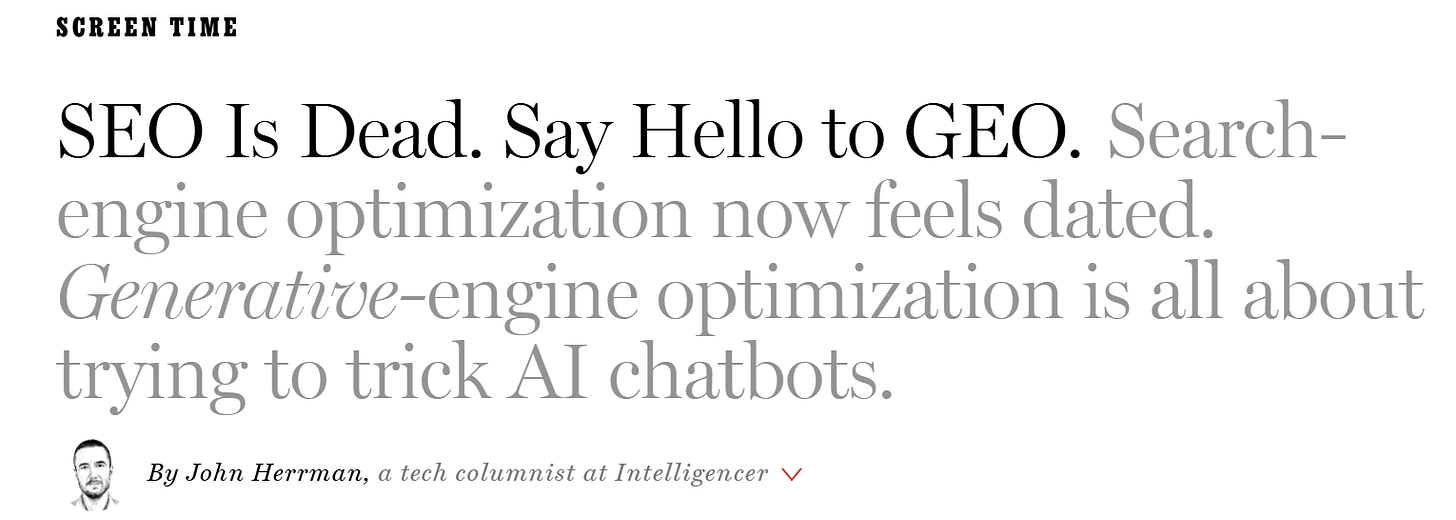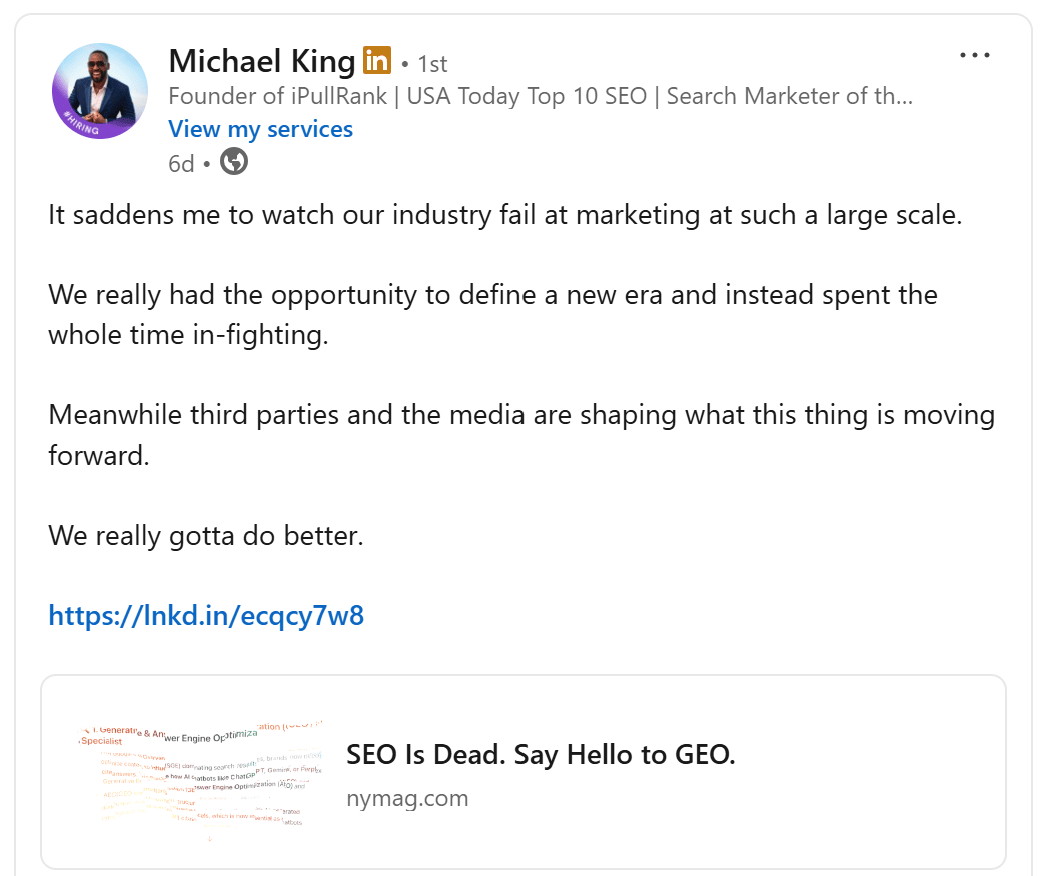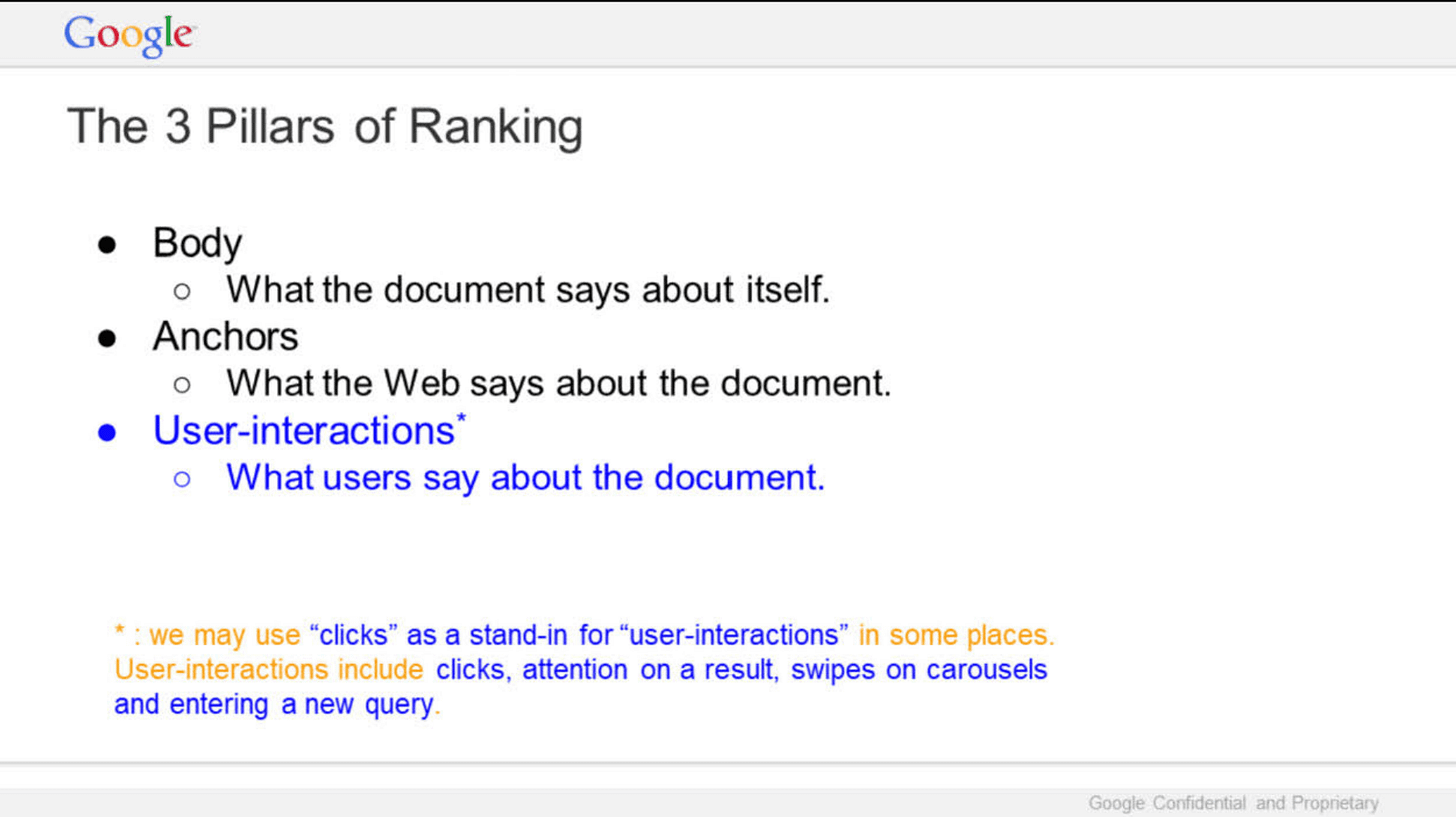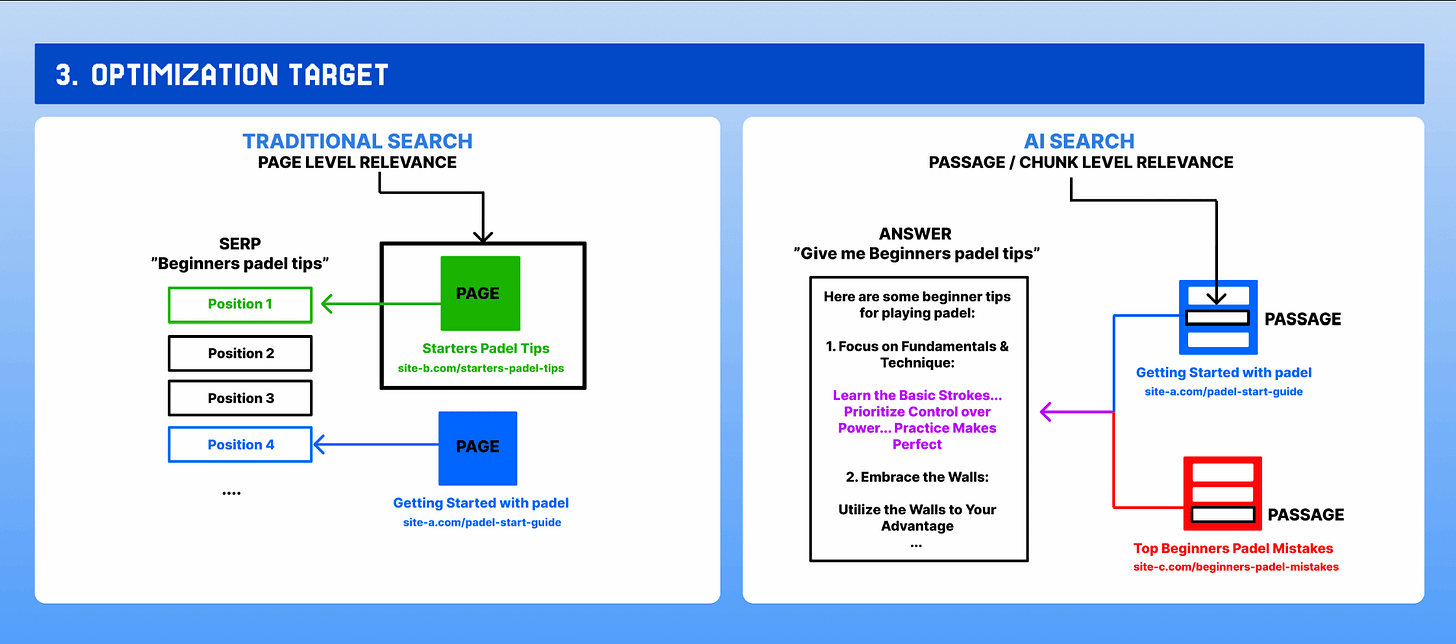Difference Between GEO and SEO
Before we dive into today's newsletter, first a word from today's sponsor Collaborator.pro!
Here’s How to Be Seen in the AI Flood: Free PDF Inside
50+ modern link building ideas + a clean way to get them live
If you want to stand out in the AI era, backlinks still matter — you just have to get smarter about them.
So when I saw this whitepaper with 50+ legit link building methods from the team at Collaborator.pro, I had to share it. It’s free, useful, and not the same recycled stuff you see everywhere.
But here’s where it gets interesting:
Collaborator.pro is a marketplace of real websites where you can distribute your content — no pitching, no awkward follow-ups, no random markups.
Just:
Pick a site (filter by DR, traffic, niche, region, and 40+ other options)
Place your order
Get your link
Thousands of websites with verified data pulled from Google Search Console, Google Analytics, Ahrefs, Moz, and other tools — so you know what you’re working with.
They’re also offering demo calls + special discounts for agency owners and SEO teams who sign up for a Master Account (read: centralized access and smoother team workflows)
📥 Grab the 60 Link Building Methods PDF
I’ve seen it in action — it’s clean, simple, and doesn’t feel like a Black Hat convention in 2012.
SEOs are back in the news again, and, as usual, not for anything flattering 🤣🤣🤣. This time we’re “Google whisperers,” which is apparently an upgrade from our previous title: “content goblins.”
In a recent article, the New York Times declare SEO is dead. If you think that's not that bad, well there's more! They also declared that, GEO, is about tricking ai chatbots 🤣🤣🤣
Obviously that sparked, once again, the debate in the SEO community: Is GEO just another name for SEO?
I’m not usually one to get caught up in debates over terminology, but this time is different. Failing to acknowledge this new era will cost us as SEOs tactically, strategically, in how we deliver our recommendations, and at the industry level as well as Mike King noted.
Well, in this blog, I'm going to share why I think SEO and GEO are not the same, and yes there's an overlap, I get it.
TL;DR
Unlike Google that uses users interactions and click data in their ranking system, LLMs don't use or have access all together to this type of user data to decide on the quality of the content.
There's a notable discrepancy between how sites get cited in ChatGPT and how they rank in Google search. Smaller sites have been reported to get cited often in ChatGPT, and sometimes websites that completely lost traffic in Google because of HCU, are getting visibility in ChatGPT!
LLMs do not render JavaScript when they process webpages. This may require special accommodations. This and other LLMs specific accommodations we may just call GEO.
The quote from Google’s Gary Illyes—often used to claim you don’t need to do anything special to rank in AI search—actually refers only to AI Overviews, not other LLMs. Plus, let’s be real: Google hasn’t always been fully transparent with us. Have you read Liz Reid’s latest blog? 😄
Yes, there’s a huge overlap in tactics, but there are enough differences to recognize that GEO isn’t exactly the same as SEO—at least for now. Maybe in the future, the gap will widen and we’ll discover even more distinctions… if we don’t keep living in denial (or maybe the gap will disappear? we don't know yet)
[UPDATE] I had a recent podcast discussing the topic. Check it out here:
Did we forget how Google works?
I have to ask, because it sure feels like it. So many debates lately seem driven by ego and the need to sound smart when in reality, the arguments have no substance imo.
Let's start from the top, it is factually correct that Google ranks content based on 3 main pillars:
content, backlinks, and USER INTERACTIONS. While visibility in LLMs is definitely impacted by the content on the page, and brand mentions across the web, user interactions are not part of the data LLMs use or have access to all together to decide on the quality of the content.
We are talking about two fundamentally different systems. The difference between how Google works and how LLMs work is not the same as the difference between how Google, Bing and Yandex work for example...
LLMs are systems that can "understand and generate natural languages like humans" even if their logic is faulty, they can talk.
So how do we expect that appearing in LLMs is identical or twin-like situation to ranking in search?
Banished from Google, but still getting visibility in LLMs
We've seen reports over and over of "smaller" websites getting cited more often in ChatGPT results. This also shows that once again, there's a discrepancy between how results appear in ChatGPT and in Google search.
Here's an interesting example posted by Chris Long of a website that is totally annihilated from Google search, by the doings of the HCU but yet is getting visibility in Chatgpt.
Chris says: "FindThisBest is particular interesting. This is a site that has been completely banished from Google. Since the Helpful Content Updates have started rolling out, this site has gone to basically zero in Google search. However, it finds itself in the top 10 results for this set of commerce queries. "
But Google said... 😄
I think my biggest problem with saying something like "you don't need to do anything special to get visibility in LLMs" is that it turns people away from test and exploring the difference in an area that's new to everyone.
Not sure where's the confidence of this advice is coming from when it's still very early on for us to make this call 😄
Even the circulating quote from Google’s Gary Illyes "that AI Search does not require specialized optimization, and that “AI SEO” is not necessary and that standard SEO is all that is needed for both AI Overviews and AI Mode" is misused.
First and foremost, Gary is referring specifically to AI Overviews, not all LLMs like ChatGPT or Perplexity. Also, ranking in those systems isn’t really his area of expertise.
Secondly, Google has been caught—let’s just say—not exactly telling the truth more than once before… so 🤷♀️
Did you read Liz Reid’s VP, Head of Google Search latest blog? where she says "Overall, total organic click volume from Google Search to websites has been relatively stable year-over-year. Additionally, average click quality has increased and we’re actually sending slightly more quality clicks to websites than a year ago" but yet they refuse to show us the data? 😄😄😄
Show me the difference
The most redundant argument of all is the passive-aggressive “I want an answer right now—what tactics are different for ranking in LLMs vs. Google Search?” What if I don’t have an answer? Does that mean no answer exists?
Well luckily we have some answers. People that are busy studying papers and analyzing things have made some notes.
Brand mentions, even unlinked ones matter. This has never been an accepted fact in SEO.
Reddit is taking up more real-estate in search today, but it also have a high influence on what gets cited in ChatGPT as it's part of it's training data. And the good news engaging on reddit with your brand, without necessarily dropping links can improve your chances of visibility in Chatgpt.
Query fan out and chunking. You've probably heard those terms circulating around. Here's a quote from Aleyda Solis that explains this beautifully:
“LLMs, like Google AI mode or ChatGPT, will use what is called a fan-out technique with lots of queries covering every angle,” says Solis. “Then they will match these variations not with whole pages but with passages, or chunks,” she said.
Here's also a visual from Aleyda's website:
JavaScript... LLMs are not proficient in rendering JavaScript like Google and other search engines. This may require special accommodations if your website is heavy on JavaScript and you want to get cited in LLMs.
Schema. This is one of the most debated topics in SEO. Some SEOs don't see schema as useful all together 😄but this is just insisting on swimming against reality, specifically when we have a confirmation from Fabric Canel the Principal Product Manager at Microsoft Bing, that that schema markup helps Microsoft’s LLMs understand content.
I can keep going and listening every difference I know about. But I think the point should be clear by now... The tactics used for SEO will work for GEO, there's a huge overlap, but they're definitely not identical.
And That’s a Wrap (Almost 😄)
I truly hope that one day our community can move beyond endless debates over terminology and focus instead on research, testing, and analysis.
But if you’re looking for reasons why traditional SEO doesn’t cover all the tactics needed for LLMs, I hope this blog serves as a good starting point.
Thanks for reading this and see you next newsletter!
Like what you read and want to support me?
Sign up for my newsletter if you're not already.
Share the newsletter and invite your friends to signup. Help me reach 2k signups by end of 2025 please 🙂
Provide feedback on how I can make this newsletter better!!!
If you're an SEO tool or an SEO service provider, consider sponsoring my newsletter. I'm also open to other partnership ideas as well.
Disclaimer: LLMs were used to assist in wording and phrasing this blog.

